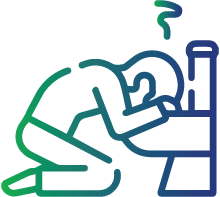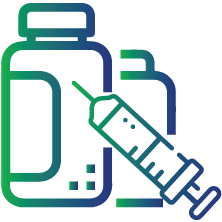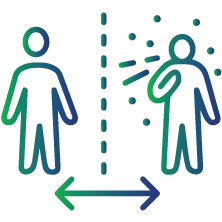
H3 Viral Marker Test
About H3 Viral Marker Test:
H3 viral marker is a blood test that includes the following three tests – HbsAg (Hepatits B surface antigen), HCV (Hepatitis C virus), and HIV (Human Immunodeficiency virus) – I &II. This test is often used to screen these three infections – Hepatitis B, Hepatitis C and HIV – as they can have serious health consequences if left untreated. The mode of transmission of these diseases is through sharing same needles, intravenous drug abuse and unsafe sex. If you believe you have been exposed to any of these infections, it is always best to seek medical professional advice and get tested
Tests included in H3 Viral Marker Test:
The H3 Viral Marker test includes the following three tests:
1. HIV – I & II (ELISA) – It detects antibodies to the human immunodeficiency virus (HIV) in your blood. AIDS is caused due to HIV virus.
2. HbsAg (Quantitative) – HbsAg test, also known as Hepatitis B testing detects Hepatitis B virus infection. It helps measure the amount of hepatitis B surface antigens (HbsAg) in the blood. It also detects past infections from HBV that has been resolved.
3. HCV (Quantitative) – HCV test, also called HCV antibody test helps in detecting antibodies to the Hepatitis C Virus in the blood samples. It is also used to find if someone has ever been exposed to the virus in the past and also to monitor the effectiveness of on-going treatment
Symptoms of H3 infections:
The common symptoms of Viral Hepatitis and HIV include:

Jaundice

Loss of appetite

Nausea

Vomiting

Abdominal pain

Fever

Dark coloured urine
Who should get tested for H3 Viral Markers?

People who show signs and symptoms of acute hepatitis such as jaundice, fever, etc

People who show signs and symptoms of chronic Hepatitis, which might indicate Hepatitis C infection

People exposed to injectable illegal drugs

People who are HIV positive

People who are on long-term dialysis

People who have been in close contact with someone who is infected with HBV, HCV or HIV
Preparation for test:
For this test, 10-12 hours of fasting state is usually recommended, where you are not supposed to eat or drink anything before the test, except water. Please inform your healthcare provider if you are on any medications or menstruating
Interpretation of the results:
HIV – I & II
A positive test results for HIV antibody usually signifies that you are infected with HIV infection where as a negative test usually indicates no infection.
HbsAg (HBV)
A positive Hepatitis B surface antigen indicates an active infection in the body whereas, the negative test results indicate no infection.
HCV
A positive or indeterminate test results of HCV antibody test with negative HCV RNA indicates past infection, and if both HCV antibody and HCV RNA are positive, then it indicates a current or on-going infection with Hepatitis C Virus in the body. A negative result indicates no infection.
FAQs
My test results are negative. Should I repeat the test?
Yes. Even if the test results show negative and you have an ongoing risk of acquiring infection then it is recommended to repeat the test. Some times during the window period the test results show negative results in spite of the infection
Should pregnant women get tested for H3 viral markers?
Yes, pregnant women must undergo a test for H3 viral markers. This aids in the early detection of infection and protects the unborn child. Getting screened for infections is the first step in receiving care and treatment required to stop the infection from spreading to the baby and enhance the mother's health. Prenatal testing is advised for specific infections for all expecting mothers (such as HIV, syphilis, hepatitis B virus, and hepatitis C virus etc).
How soon can a test indicate an infection with the hepatitis virus?
The development of antibodies typically takes 2 to 10 weeks after exposure to different types of hepatitis virus. The antibody test is positive once the antibodies are developed. One may also get falsely negative results prior to this window period
How can Hepatitis infection be prevented?
Hepatitis infection can be prevented by:
· Getting vaccinated for Hepatitis A and B infections
· Using condoms during sex
· Not sharing needles for injecting drugs
· Maintaining proper hygiene
· Avoiding sharing personal items such as comb, towel, brush, bar soaps, pillow, etc. with infected individuals
· Drinking bottled water while travelling
· Avoiding areas of poor sanitation
Can the hepatitis B vaccine be administered after HBV exposure?
Yes. If you suspect you have been exposed to hepatitis B virus, contact your health care provider immediately. If you receive preventive treatment early, preferably within 24 hours of exposure to virus, you may reduce the risk of infection. Early detection helps in early treatment thereby reducing the risk of complications associated with the disease

